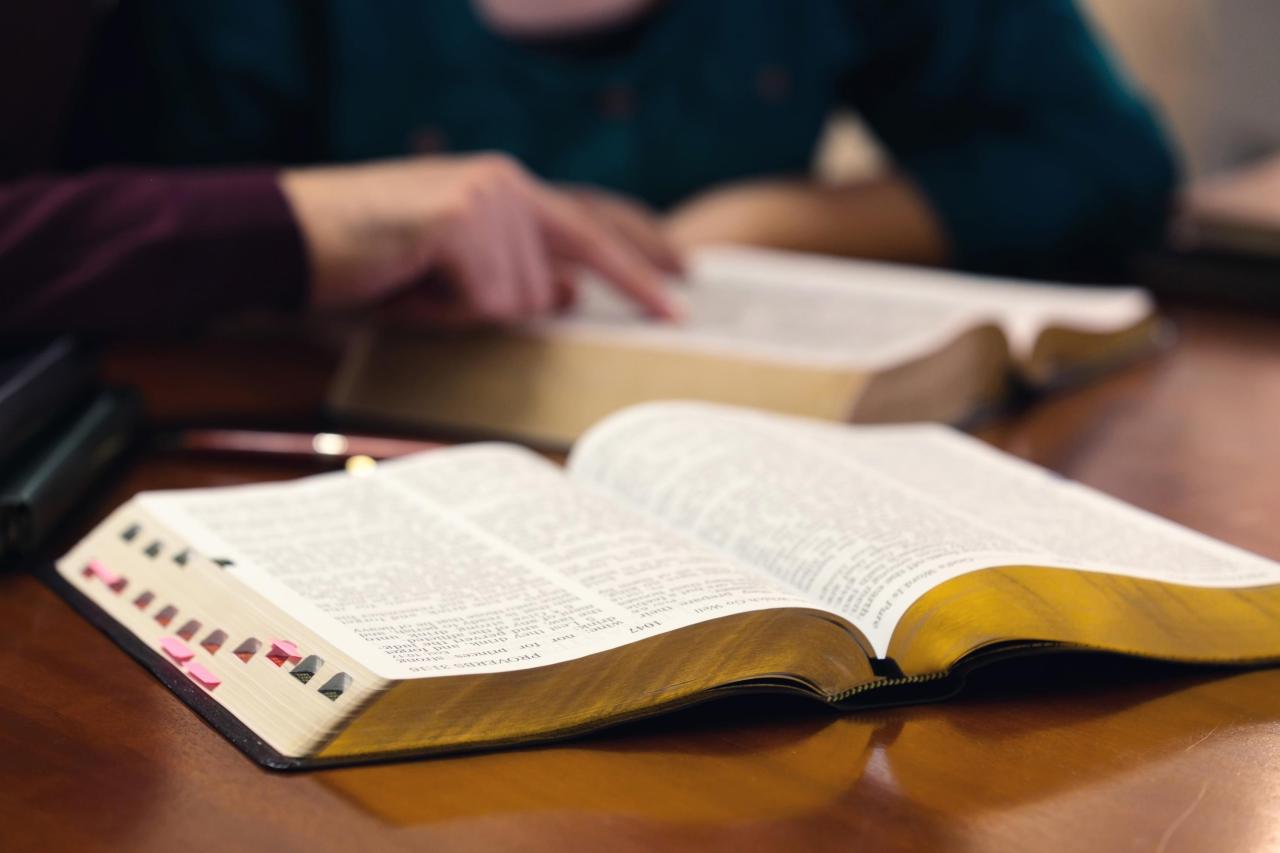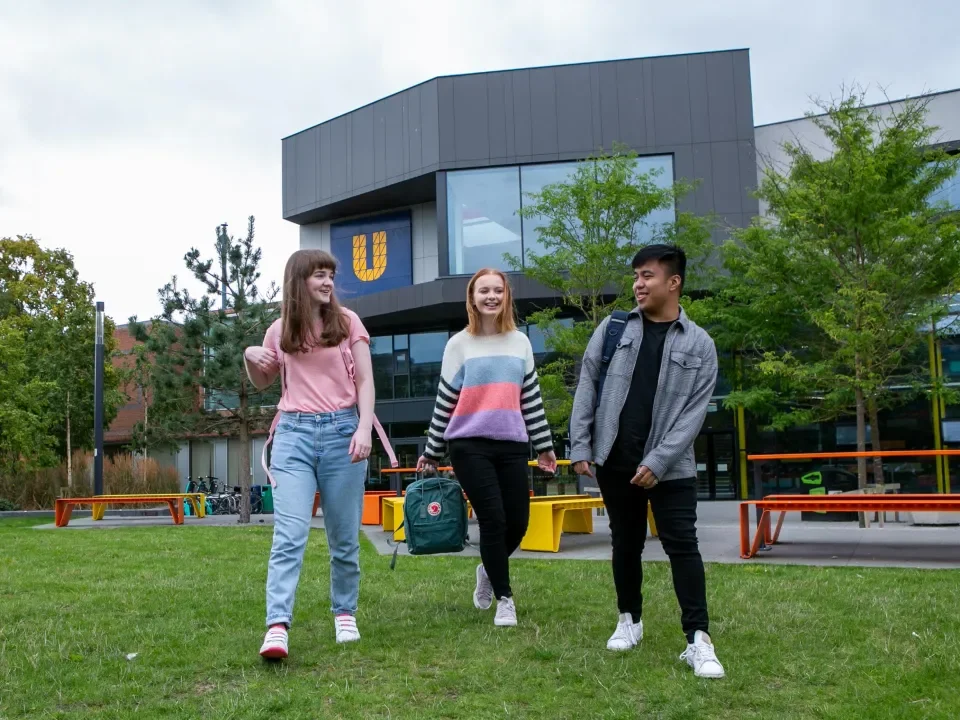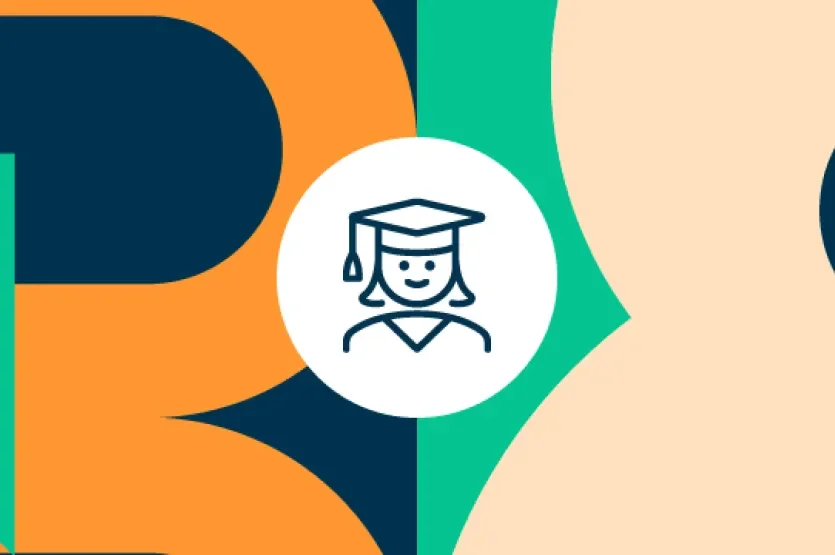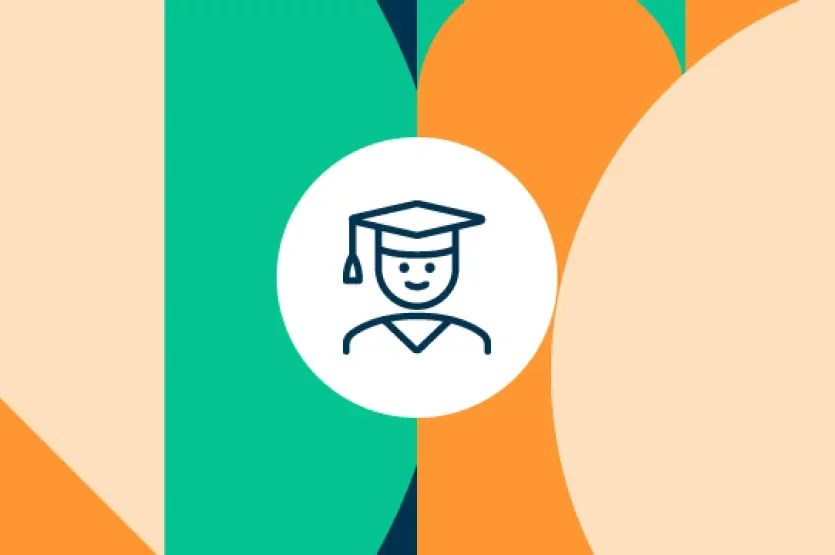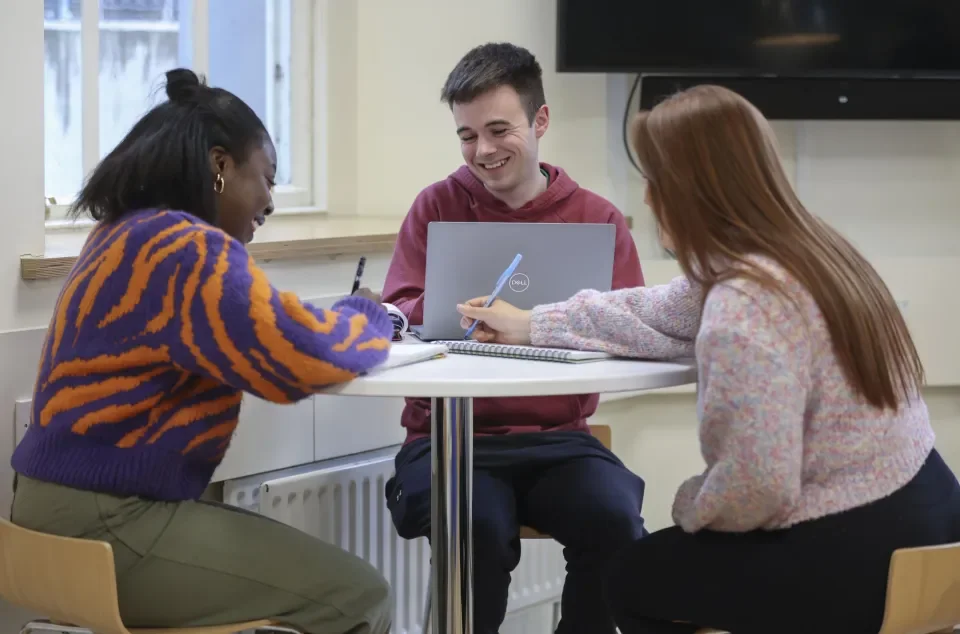Overview
Scholarships:
The DCU School of Theology, Philosophy, and Music is pleased to offer a number of scholarships for the DC300 - BA in Theology and Religious Studies open to students entering the programme in September 2024.
Enquiries may be directed to: Dr John Murray at john.murray@dcu.ie or by phone at (086) 078 3438. These scholarships are generously funded by the Mater Dei Scholarship and Grant Committee.
Overview
Are you curious about the significance of religion in today’s society? Do you want to understand more about how we can form welcoming, just and sustainable communities?
The BA in Theology and Religious Studies at DCU offers the opportunity to reflect on religion in a complex world.
This honours degree is an exciting course for mature students (aged 23 or over) wishing to pursue the academic study of religion. You’ll explore the origins and development of some of the world’s major religions, along with the beliefs and practices that are central to these traditions.
You will also have the opportunity to study the Bible and other sacred texts, explore the importance of ethics in our personal, social and political lives, and reflect on the place of ecumenical and interreligious dialogue in the contemporary world.
The course caters for a broad range of backgrounds including those who wish to study theology and religion for personal enrichment as well as those who would like to study theology with a view to being more active in their local community.
It is particularly suited to mature students interested in areas like community work, parish ministry and liturgy, youth and young adult ministry, social justice engagement, ecumenical projects, dialogue with other faith communities, and education and school boards.
This degree also serves as a qualification for those wishing to pursue postgraduate study or research.
Why DCU
DCU People
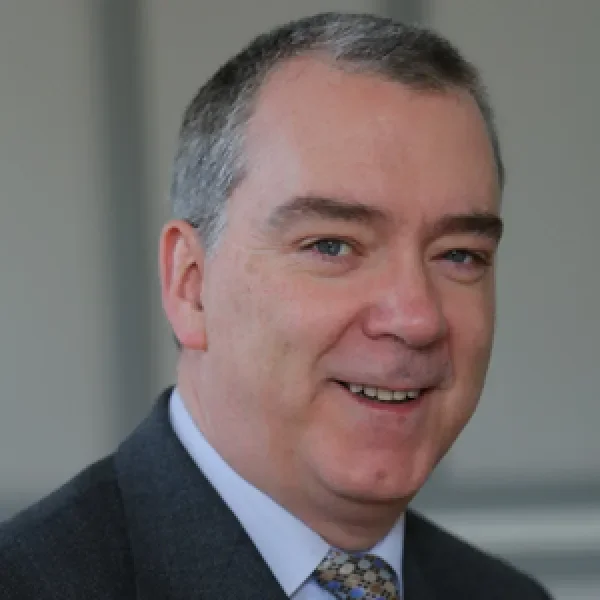
Hi, I’m John Murray and I chair the BA in Theology and Religious Studies here at DCU.
Read more about John Murray
Careers & Further Options
Careers
This degree will help you expand your knowledge and skills to pursue an interesting career or for continuing professional development across a range of areas such as community and social justice work, pastoral ministry and teaching.
It can enable you to study theology and religion for personal enrichment. The degree also serves as a qualification if you wish to pursue postgraduate study or research in theology and religious studies.
For instance, you may like to understand these areas more deeply: pastoral and community work; adult religious education or parish catechesis; youth and young adult ministry; biblical studies; social justice groups; ecumenical projects; inter-faith dialogue; parish councils; school governance and leadership.
- Teacher (with further study)
- Advocacy manager
- Adult Educator
- Community Worker
- Youth Worker
- Pastoral Worker
- Chaplain
- Interreligious and intercultural worker
- Charity worker
DCU graduates are highly sought after by employers. Our Graduates work in environments ranging from large multinationals to SMEs, family businesses and start-ups across every sector.
DCU Careers Service has a number of learning and development initiatives in place for our students, giving them the skills they need for a successful career path.
Entry Requirements
Application to this programme is based upon maturity of years. In order to be eligible for this course applicants must be aged 23 or over on the 1st January in the year of application. As part of the application process, the relevant life/work experience of the applicants and previous studies undertaken will be reviewed to determine eligibility for the course. Applicants must include with their application a short personal statement indicating why they are applying for this programme.
See under General Entry Requirements
See under General Entry Requirements
No Entry Path
Where such candidates are non-native speakers of the English language they must satisfy the university of their competency in the English language. Click here for further information on international applications.
Course Structure
The BA in Theology and Religious Studies is a part-time flexible course. You will be expected to complete the course in four to five years. The course follows a five-year cycle, with students entering the course in any of the years of the cycle. Normally a student will study between five and six modules per year.
Credits and qualifications
Each module is worth 7.5 ECTS credits. You may exit the course with a Certificate (after successfully completing eight modules), a Diploma (after successfully completing sixteen modules), or the BA degree (after successfully completing twenty-four modules).
About the course
You will learn how to critically engage with and evaluate a range of theological and religious viewpoints. Building on theological and ethical foundations, you will learn how to contribute to personal and social transformation. By the end of this unique course, you will have learned how to appreciate and critique the intellectual foundations of the academic study of religion, and have developed new insights into cultural and religious diversity. Each year, modules drawn from theology, biblical studies, religious studies, philosophy, ethics, and ancient theologically relevant languages will be offered for study.
Final year
In your final year of study, you will have the opportunity for individual guided research, working with a supervisor on a topic of your choice on a research paper of 6,000 words.
Develop your skills
During this course you will have many opportunities to acquire key transferable skills, such as assimilating new knowledge; the close analysis of ancient and modern texts; research and writing skills; time management; and teamwork skills. You will also engage in a dialogue between contemporary ethical issues and a range of classical and contemporary texts and thinkers.
Timetable
This unique course is taught on Thursday evenings from 6pm to 9.30pm and on four Saturdays throughout the academic year.
What Will I Study?
While content of the course may change over time, these modules are indicative of what you will be studying in each year. [Each year, also, there will be a number of introductory modules on theological languages available, to choose one if one wishes, from the following: Biblical Hebrew; Koine Greek; Classical Latin; Classical Arabic.]
- Paul: Apostle to the Gentiles
- Bioethics: Theological and Philosophical Perspectives
- History of Philosophy
- Eastern Religious Traditions
- Ecumenism
- Faith and Revelation
- Gospels and Acts
- The God Question
- 20th Century Theologians
- Introduction to Judaism
- The Bible and Art
- Faith Development
Hebrew Scriptures: The Pentateuch
Social Ethics: Theological Perspectives
Spirituality
Ecclesiology
Theology of the Sacraments
Religious Education: Critical Questions
- Women in Scripture
- Christology
- Theological Anthropology
- Introduction to Islam
- Foundations of Theological Ethics
- History of Christianity
- Hebrew Scriptures: The Pentateuch
- Social Ethics: Theological Perspectives
- Spirituality
- Ecclesiology
- Theology of the Sacraments
- Religious Education: Critical Questions
Fees and Funding
Fees
How To Apply
To apply for this programme:
- All applicants should apply through DCU's Student Application Portal here. Here's a quick step by step guide if you need help with your application.
All Applicants must submit
- Personal statement of 1,000 words maximum
Non Native English Speakers must also submit:
- Evidence of English competency which meets DCU entry requirements - see link
Application Dates
EU and non EU Application closing dates
Applications will open on 21st October 2024 for September 2025 entry and will be accepted on a rolling basis until the programme is full or until the following dates:
The closing date for non-EU applicants is 1st July 2025.
The closing date for EU applicants is 31st July 2025.
Non EU Applications
Please note if you are a non EU student and require a study visa, you are not eligible to apply for part-time programmes as study visas are only granted for full-time programmes.
Queries
Queries from EU applicants should be directed to ugadmissions@dcu.ie
Commencement of Programme
The programme commences in September 2025.
Please see Application Procedures or E-mail ugadmissions@dcu.ie.
Life On Campus
DCU’s Clubs and Societies offer a great way to meet like minded people and make new friends. There’s a whole range to choose from and you might also be interested in the Raising and Giving Society, Christian Union, Gospel Choir Society, Volunteers Overseas, Self Development Society, Saint Dominic Society, and St Vincent de Paul.
At DCU, our students can expect a unique campus experience. We are known for our excellent teaching and learning facilities, our active clubs and societies, and our great social and sporting facilities. All this makes DCU an exciting place to be.
DCU has three academic campuses; Glasnevin, St. Patrick’s and All Hallows (both in Drumcondra), all close to Dublin City centre.
They can be reached by public transport, Dublin Bus and Bus Éireann, with our Drumcondra campuses a ten minute walk from Drumcondra Train Station. Glasnevin is a 20 minute walk from St Patrick’s and All Hallows. They are also linked by Dublin Bus.
Each campus has a library (O’Reilly, Cregan and Woodlock Hall), study spaces, restaurants, and on-campus residencies. There are sports facilities on Glasnevin and St. Patrick’s, and there is a dedicated sports campus, St Claire’s, located near Glasnevin on the Ballymun Road.
DCU’s 19,000 students have access to exceptional teaching and learning facilities across our three academic campuses.
These include modern learning theatres, research centres, a new media and TV studio, radio/podcast studios, computer suites and advanced labs in the areas of Languages, Engineering, Physics, Chemistry and Biotechnology, as well as a Sports Performance centre and a training hospital ward. In 2021, we opened our first virtual reality ‘Leadership Lab’, which is located in our Business School.
We continue to improve and update our facilities. For example, construction of a new world-class STEM facility is underway on the Glasnevin campus. With capacity for an extra 3,000 STEM students, this facility will advance DCU’s international reputation for excellence in science and health, computing and engineering disciplines.
Studying in DCU isn’t just about course work. The university is rich in student life and activities.
There are more than 140 clubs and societies for students in DCU, with ‘Clubs & Socs’ days taking place on both the Glasnevin and Drumcondra campuses at the start of the academic year. They span everything from rugby to rock climbing, anime to jazz.
For many students, sport is an important part of the DCU experience. DCU’s Sports Complex boasts a 25 metre swimming pool, fitness centre gym, all-weather pitches and squash courts, as well as soccer, GAA and rugby pitches. DCU Dóchas Éireann, the university’s GAA club, is the largest third level Gaelic Games club in the country. Meanwhile, DCU Athletics has been Ireland’s highest achieving university club for many years. And DCU has dozens of other clubs to get involved in, from Archery to Weightlifting.
The Glasnevin campus is home to our purpose built, state-of-the-art student centre, The U, which serves the needs of a rapidly growing student body. Here, you will find the Student Leadership and Lifeskills Centre, performing arts and cultural spaces for students and the wider community, and the Entrepreneurship and Innovation Hub. Also located on our Glasnevin campus is The Helix, our renowned performing arts centre.
On our St Patrick’s campus, we have the Java Student Hub, a vibrant, warm and welcoming space where students can meet for coffee, play music, use the projector to watch events, or just relax. The walls of the Java Hub were designed based on the cultural history of St Patrick’s Campus, including the special references to the notable sporting history and history of the arts.
We have a number of academic, professional and social supports for students.
Student Advice & Learning Skills Centre - Offers a wide range of supports and services to students and advice
The Writing Centre - drop-in writing workshops for students through the academic year
Maths Learning Centre - provides maths support for students of all ability levels with maths modules
Student Learning - facilitate the transition from passive to active learning for students at DCU, by teaching study skills, nurturing critical thinking and building student confidence.
Careers work with students to help them on their professional journey into graduate employment.
Our student support team offers a comprehensive support programme, helping students make that all important transition into university life and focusing on building confidence and skills which are key to success at third level.
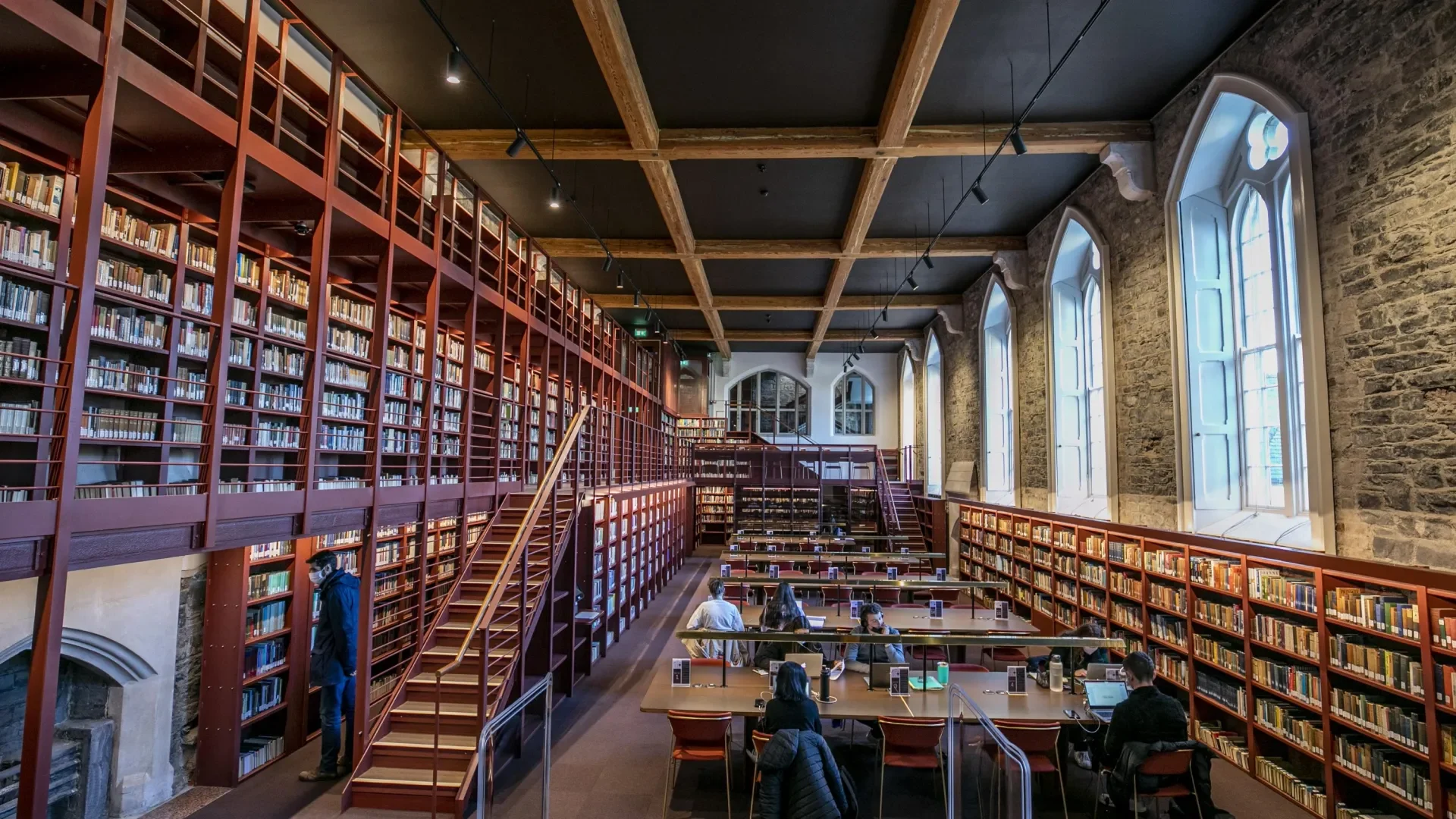
DCU All Hallows Campus
FAQs
Is DCU all one campus?
DCU is a multi campus university - the Glasnevin, St Patrick's and All Hallows campuses. The St Patrick's campus is where the Education courses are taught and some of the subjects from the BA Joint Honours degree. There is a 20-25 minute walk between the campuses but there are buses and bikes available to go between them also.
Click here to see maps of all of our campuses
If I'm studying on the St Patrick's campus, can I use the library and sports centre on the Glasnevin campus?
Yes, all facilities such as sports and accommodation are open for all DCU students to avail of.
Are there libraries in DCU and if they have wifi and work stations?
We have a brand new state of the art four floor library on our St. Patrick's Campus which complements the existing library on the Glasnevin campus. There is free wifi, work stations as well as desktop computers.
Does DCU provide accommodation?
DCU does have on-campus accommodation for undergraduate and postgraduate students, and you can find out more and apply via the Accommodation Office webpage.

